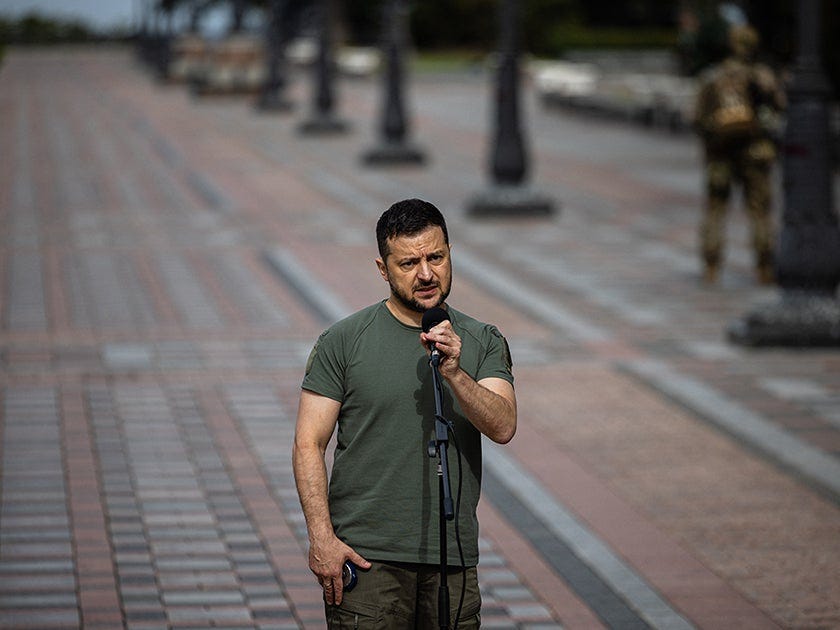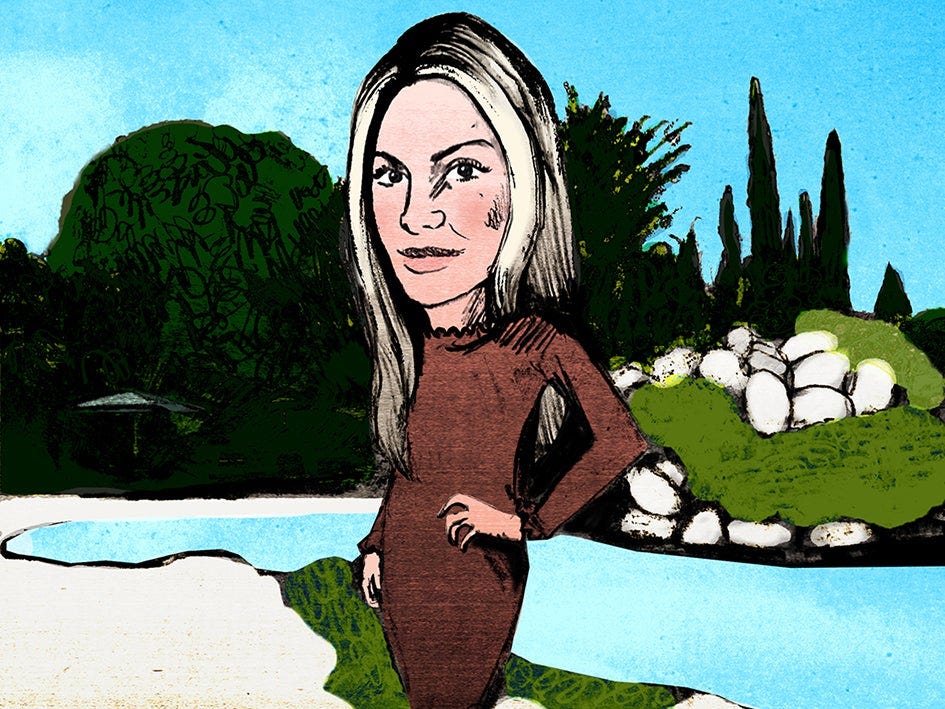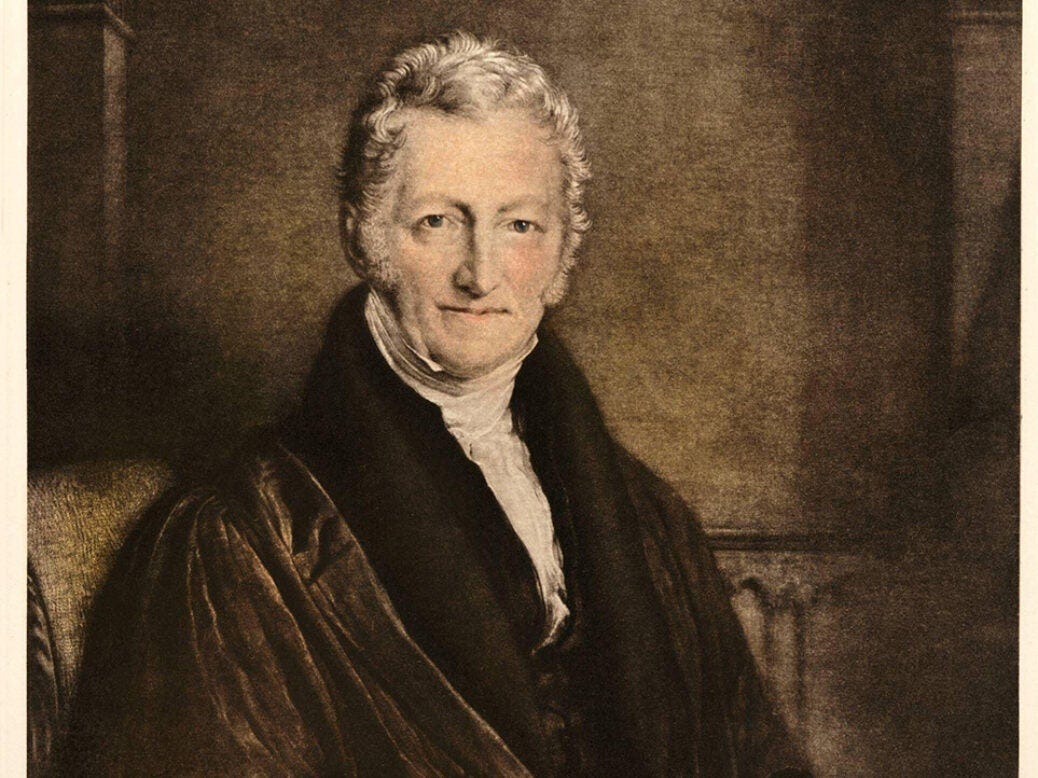The Saturday Read: On this land
Inside: Zelensky, Stormzy's generation, Sheila Heti, liberal order, paradoxical politics.
Good morning. Welcome to the Saturday Read. For any first time readers this is the New Statesman’s weekly guide to the best writing on ideas, politics, books and culture, sent to NS subscribers and registered readers. This is Harry, along with Will, Pippa, and George Monaghan.
Click here to read this online if it cuts off midway. If you already subscribe to the NS, thank you. If you don’t yet and these pieces intrigue, perhaps you’d like to try a subscription.
1—“Beneath Keir Starmer’s win-at-any-price pragmatism there is an inert immobilism.”
John Gray takes aim at the progressive left and the establishment right. Both wings of British politics, he argues, are clinging to the ossified remains of Margaret Thatcher’s legacy. WL
Starting with Thatcher’s privatisation of water in 1989, utilities and infrastructure have been sold off to the highest bidder – often the government-owned corporation of a foreign state. In a move Thatcher would not have contemplated, core state functions – prisons, the police, border control and the armed services – have been underfunded and hollowed out. The state has become more like a global NGO than an institution whose task is to serve any national interest. Since the Brexit vote in 2016, Tory governments have facilitated mass immigration on an unprecedented scale. The notion that British citizens might have a primary claim on the country’s housing stock cannot be voiced in polite company, although there is no chance of meeting housing needs when net immigration is running at hundreds of thousands a year.
2—“Our president is in Kyiv and it’s like a beacon that he’s still here.”
Volodymyr Zelensky fired Valery Zaluzhny, the commander-in-chief of Ukraine’s armed forces this week – and a possible future presidential rival. Lindsey Hilsum, Channel 4 News’s storied international editor, reviews the new book on Zelensky, by Time’s Simon Shuster, who has had better access to him than anyone. Click through for revelations such as this: when the Russian invasion was imminent, Zelensky blocked Zaluzhny from overtly deploying forces to prepare, fearing an exodus – a mistake that allowed the Russians to occupy much of south-east Ukraine. HL
Everything changed after Russian troops committed atrocities in Bucha and nearby towns in spring 2022. Zelensky grew angry and bitter. Finally, he understood that Putin would never accept that Ukraine was an independent country, not “little Russia” as it had been seen during Soviet times and under the Russian empire. The Ukrainian government passed a law banning any talks with Putin. “Zelensky grew up believing that the Soviet Union deserved respect and admiration”, but this did not survive the war, writes Shuster. Zelensky tells him, “Now I feel revulsion toward everything linked to the past.”
3—“Instead, America loiters.”
“Its partners sense the hesitancy and exert reverse leverage on Washington,” writes Patrick Porter, of the state of American foreign policy under Joe Biden, which critics would cast as: talk loudly, act softly. In today’s Middle East, Porter argues, America’s professed values are a bitter cup from which they are sparing their partners in the region. We shouldn’t be surprised by that. HL
The liberal critique of Biden, that faults the president for not living up to his own rhetoric, only encourages the delusion that got us here: that a far-sighted, benign hegemon can tame the world into liberal values, and that the world outside the west is a group of one-dimensional ethicists wishing to be “led.” But is it not rather the whole proposition of “liberal order” that fails interrogation?
America is generally more benign than other leading states – its statecraft at its best has been creative and made the world better, from the Marshall Plan to rebuild Europe, to the Nunn-Lugar program to eliminate post-Soviet nuclear arsenals. But “benign” and “lawful” are different propositions. And the notion that the superpower consistently binds itself by “rules” and liberal constraints leaves out too much reality, from coups to torture to conniving with dictators to sheer rule-breaking caprice. This is not because of some inherent wickedness. It is because the world is a treacherous place that shoves states towards ruthless power politics.
4—“Grime is a uniquely and determinedly British genre.”
Gary Younge profiles the Stormzy generation, who he casts as not quite millennial or Gen Z. Those born between 1991 and 1999 “had more frustrations than most”, Younge writes. They were teens when bankers crashed the economy, the austerity project began and Londoners torched shops during the 2011 riots. Reading this piece gave me not only a better understanding of a genre, but of who I am. PB
We see artists go in and out of prisons and emergency rooms and then, mostly, into early adulthood, taking jobs in Apple stores and call centres selling car insurance and emergency repair cover as they struggle to make it. We see the thrill, abandon and adulation that comes with breaking through curdle into drudgery and fatigue as they negotiate the professional demands of their success. We witness the private frailty behind the public macho personae as they lose loved ones, most to natural causes but some to violence, and create loved ones, as children arrive, channelling their sense of responsibility.
The writing is sublime. “At its essence MC culture is an act of narration,” he writes. “A history of a city, a town, a country now documented and made permanent, cave paintings that linger in the ether reminding us that on this land, in this time, a community once stood.”
5—“Here is so much of being alive.”
For her latest book Sheila Heti loaded 500,000 words of her diaries into a spreadsheet, organised the sentences alphabetically, then kept the best. It’s a demanding concept, for the reader. Happily, Anna Leszkiewicz is sufficiently versed in Heti to talk us through it. GM
Alphabetical Diaries is not fiction, it does not tell a story. But it has its own arc – from the declarative A’s through the chastising D’s (with their Dos and Do nots), the soaring ego that emerges in the I’s and the bitter self-questioning of the W’s. There are climaxes, realisations that edge towards enlightenment. There are moments of sudden, poignant beauty, of calmness and neatness, when the world is right.
“It was a beautifully sunny day. It was a brilliant morning, I could have read all day. It was a nice, warm night. It was a small beach, the size of a backyard. It was as if all the apples, all the stories, gave way to the season where there was only one apple.”
And there are moments of hope, that reach out beyond the pain of the present, to a higher calling. “I came to my computer and started working on my book, understanding it more and more. I can continue going in this direction. I can do it. I can do this, too. I can do whatever I want. I can ease off the pressure… I can hold a much more complex picture in my head. I can look at my bookshelves. I can look over that high wall.”
From tracking data to working with your supply chain, businesses can make small steps to big carbon reductions.
With technology already reshaping the ways we work, futurists such as Tracey Follows are exploring how these changes might impact you and your employees in exciting new ways.
Read our latest article in collaboration with Virgin Media O2 Business on how to make faster progress on sustainability in 2024.
6—“That this notion could have any currency at all was a sign things were beginning to change in the world order.”
Matthew Longo’s new book tells the colourful story of a rebellious picnic on the Austro-Hungarian border in the summer of 1989. The story offers, at comprehensible scale, the spirit of release that would bring down the Berlin Wall two months later. William Boyd reviews it with an eye for humane detail: the guards who let it happen, Longo writes, exercised “the everyday morality of looking the other way”. GM
On the day itself, 19 August 1989, in a huge meadow by the border, thousands gathered for the picnic. There was a huge tented village, hundreds of neatly parked Trabants, mobile kitchens where huge pots of goulash were simmering, a stage for speeches and a concert. But then, spontaneously, hundreds of the picnickers decided to leave the site and head up a track to the actual Austrian border – about 5km away – where, under the eyes of the border police, who happily did nothing, they broke through a fence and poured into Austria.
“The last metres felt endless,” Longo writes. “Annette sprinted towards the gate, crashed into it with all her might and the force of those beside her. She felt the compression, the firmness of the wooden crossbars, the sweaty oneness of their bodies… When the gate gave, she pushed through and kept running. She couldn’t bring herself to stop.”
7—“I definitely didn’t feel liberated.”
The Playboy founder and notorious libertine Hugh Hefner redefined American morality. But for his widow, Crystal, Hefner’s empire was built on a misogynistic world-view that brooked no dissent. We spoke about the “trauma” of her decade in the Playboy mansion, whether Hefner’s sexual revolution helped or harmed women – and how bad he was in bed. PB
For Hefner, Playboy wasn’t just titillation: he aimed to create a new morality. The “Playboy philosophy”, which Hefner wrote in 25 instalments from 1962, was, he said, “an attempt to re-evaluate some of the social and sexual ills of our time”: purity, tyranny, absolutism. Many of his causes – legalising marijuana, abortion rights – prevail today.
Some saw Hefner as liberating America from social and moral conservatism. To others, he was a misogynist who created another men-serving role for women to fulfil: if you didn’t want to be a housewife, you could be a sex object instead. Hefner’s revolution may have been abhorrent to conservative-evangelical America, but it was also curiously safe. For all he professed to loathe the concept of a “code” by which to live, his ideal of beauty and female sexuality was particular and closely controlled, crafted only to fulfil his fantasies – to the extent that the Harvard theologian Harvey Cox once called it “basically anti-sexual”.
8—“Her mission is to ‘shame’ Ed Davey into standing down. And then what?”
Ever since Mr Bates vs The Post Office, Ed Davey has been pursued by criticism, accusations and, in his south-west London constituency, Yvonne Tracey. The independent councillor – and former deputy postmistress – is standing against Davey in Kingston and Surbiton on behalf of the “little people”. Hannah Barnes tagged along with her. The campaign is already nasty. WL
Davey has lost from such a height before: having won in 2010 with a 50 per cent share of the vote, he lost the seat to the Conservatives in 2015. It’s also not unheard of for large majorities to be overturned by an independent: think of the former BBC journalist Martin Bell’s historic victory in Tatton in 1997, when he stood as the anti-sleaze candidate against the Conservatives’ Neil Hamilton. That campaign was also categorised by bitterness and foul play. Kingston and Surbiton might be heading for a similarly dirty fight.
Within less than a fortnight of Tracey announcing she would stand in Kingston and Surbiton, legal letters had been issued. Tracey has demanded that what she says is a defamatory tweet by Liberal Democrat London Assembly member Hina Bokhari be removed. In it, Bokhari claimed leaflets issued by Tracey during an earlier campaign had been investigated by the police “as hate crime”. “I’ve never so much as had a parking ticket,” Tracey told me.
9—“Which channel do you turn to?”
Newsnight’s budget has been drastically cut. What’s new in news? Anoosh makes a compelling case for ITV News at Ten, whose editors and presenters have eschewed foreign reporting and Westminster scooplets for stories that affect the nation, prioritising investigative social affairs reporting. That has often been a path to fewer viewers in the past, but ITV, which also broadcast Mr Bates vs the Post Office, is having an unusual impact. (Anoosh reported from Port Talbot steel works too this week.) HL
In January 2024, the quiet radicalism of the broadcaster grew louder. Its four-part drama, Mr Bates vs the Post Office, pushed the UK government into overturning the convictions of hundreds of sub-postmasters wrongfully prosecuted for fraud. And its shocking exclusive footage from Gaza – showing a civilian waving a white flag being shot dead – led to Rishi Sunak and US officials being questioned over whether Israel had committed a war crime… If the BBC News is the establishment, Sky News is the establishment but shinier and more expensive, Channel 4 News is the social justice warrior, and GB News the populist reactionary, then what is ITV?
10—“This is the greatest danger… a future in which people accept that there is no other way.”
If you missed our mid-week email on it, our cover story this week is Will Dunn’s grand tour of British corruption. The Future Fund funnelled taxpayer funds to Rishi Sunak’s wife. David Cameron honoured Michelle Mone and lobbied for Lex Greensill. Hancock’s pub-landlord neighbour won an NHS contract. Robert Jenrick approved donor Richard Desmond’s luxury-flat development the day before a costly tax was instituted. Randox paid a £100k consultancy fee to Owen Paterson, who introduced them to the government, who gave them £777m in contracts. The Treasury refused Will’s FOI request, but he has found more than enough on his own. GM
Behind the football club on the outskirts of Calmore, Hampshire, on the eastern edge of the New Forest, there is a patch of waste ground – one day, it will be an Aldi supermarket – and beyond that, there is a small caravan site and a scrapyard. At the back of the yard more than 1,000 pallets had been piled up, two or three deep, in the open air. In places their wrapping bulged and split, and their contents – thousands upon thousands of bales of plastic medical aprons – had begun to spill out, blowing away into the neighbouring nature reserve.
The aprons are gone now, turned into plastic bags. PPE Mountain should perhaps have been preserved, as a national monument to fiscal carelessness. Ministers and private secretaries could have been made to climb its disintegrating flanks as a training exercise. No matter: we have plenty of reminders of how far the integrity of the state has fallen.
Will’s Best of the Rest
FT: Former German spy chief investigated for right-wing extremism.
Axios: Techno-optimism is America’s fastest growing ideology.
Politico: Biden trash talks Trump. They should just wrestle for the job.
Guardian: British Indians don’t like Labour any more.
Tyler Austin Harper: Polyamory is for rich bastards.
Adrienne LaFrance: The rise of tech-authoritarianism.
Gary Saul Morson: Russian exceptionalism. Morson is essential on Russia.
Katy Balls: The wonderful world of Lord Cameron of Chipping Norton.
Marina Hyde: What next for sad clown Laurence Fox? A warning to men everywhere not to get divorced.
“When he was there it turned into a smoked-filled ego w***fest”.
Elsewhere on the NS
The digital PR behind Rishi Sunak fuelled his path to power in 2020. Now it seems emblematic of his inescapable problems, argues Jonn Elledge.
More good news for Labour: their path to a majority has eased, George Eaton reports.
Brexit is less settled than you think, David Gauke suggested this week. Fifty-seven per cent of the UK will be pleased to hear that.
Nicola Sturgeon turns to Stefan Zweig’s The World of Yesterday.
Anoosh Chakelian and Freddie Hayward met two former cabinet ministers, Labour’s Liam Byrne and the Tories’ George Freeman. The latter handed Keir Starmer a gift at PMQs this week.
No one is safe from deepfakes, not even Taylor Swift, says Sarah Manavis.
Ann Manov actually enjoyed a film she reviewed. It was American Fiction.
The Zone of Interest, which takes its premise – and not much else – from Martin Amis’s novel, is a Holocaust film like no other.
Lawrence Freedman investigates: who is winning the war in Ukraine?
Do you know about Malthusian ages? You’re living in one. Robert Kaplan explains.
RAF Scampton used to be known as the birthplace of the Dambusters. Now, as Felix Pope reports, it’s a byword for increasingly bitter battles in England over where to house asylum seekers.
Book of the week: My Friends by Hisham Matar
What does it mean to be exiled? For those of us fortunate enough never to have experienced it, My Friends may be the closest we can get to understanding the sense of dislocation. Hisham Matar’s Libyan protagonist Khaled, a dissident of Muammar al-Gaddafi’s regime, has by 2016 – when the story is set – lived in London for 30 years. Khaled’s titular friends are two other Libyan émigrés; the trio’s navigation through the intervening decades shows how each has internalised the pain of being shorn from their homeland.
The novel is structured around a series of recollections, triggered by a circuitous walk Khaled takes from King’s Cross station to Shepherd’s Bush. Khaled’s wanderings follow in the footsteps of Joyce’s Leopold Bloom, but the novel is more than a reworking of Ulysses. Matar is a Pulitzer Prize-winning author born to Libyan parents in New York and raised in Libya and Egypt before settling in Britain. He is well versed in the dissonance of exile, and My Friends feels like an artefact of that flux. Matar’s charged writing allows us to share in the tragedy of Khaled’s plight. Barney Horner
Perhaps you might even like to subscribe to the New Statesman. Stay up to date with everything you need: from news and analysis to comment, criticism and long-reads.
Whether you’re looking for a sharp blog or a finely written feature, the New Statesman has you covered. Have a good week, and catch you next Saturday.






















